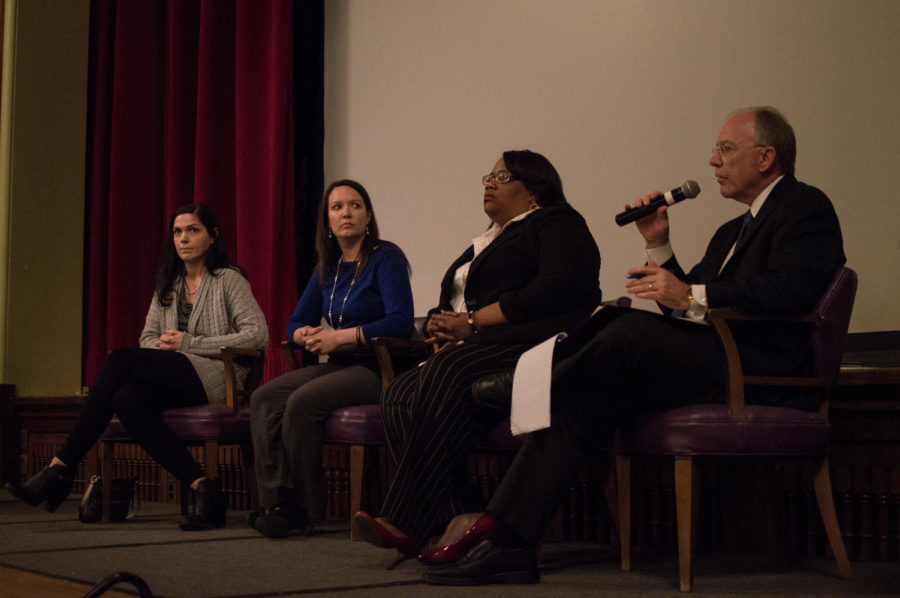Students ask for clear answers from administrators on sexual assault policy
April 16, 2015
“What is the punishment for a student who rapes?”
“Why hasn’t there been an apology to victims for not doing better?”
Iowa State students — some of whom were sexually assaulted or have a close relationship with someone who has — had many questions for a panel of administrators at an open forum in the Great Hall of the Memorial Union Wednesday night about how the university will improve the handling of sexual assault cases.
The panel came after the showing of “The Hunting Ground,” a documentary that explores university administrators’ mishandling and perpetuation of sexual assault on college campuses across the nation.
Iowa State is currently under investigation by the Department of Education’s Office of Civil Rights for their handling of a sexual assault case.
Administrators taking questions including Dean of Students Pamela Anthony, Director of Judicial Affairs Sara Kellogg, Director of the Department of Public Safety Jerry Stewart and Story County Sexual Assault Response Team coordinator Steffani Simbric. Also in attendance were President Steven Leath, Vice President of Student Affairs Tom Hill and Title IX coordinator Robin Kelley.
Chelsea Schmidt, senior in linguistics who requested and helped organize an open forum with administrators, had three areas of concern.
Students lack information about the medical policy for survivors, there is no clear method for mandatory reporting and Iowa State’s sexual assault policy is hard to navigate, Schimdt said. She wants a plan of action.
Schmidt said Access Assault Care Center is the best mandatory reporting and advocacy center she knew of for students, and the university does not fund the organization that partners with Iowa State to help victims.
Anthony said the university is looking to update policy, it “is not changed over night.” She said university officials have a difficult time getting feedback from students on how policies serve them. Above all, Anthony said administrators need to hear from students on how Iowa State policy treated them and what students would like to see be changed.
Kellogg said policy was updated in 2008.
“We changed our policy for the first time to be an affirmative consent policy. It was a very broad group of individuals that got together to discuss what our policy should look like and how it should better represent students,” Kellogg said. “Those conversations have been ongoing and we have made changes and engaged students in conversations since those initial policy changes.”
Another student took issue with the the vagueness of the university’s policy and wanted to know the exact punishment students receive if they sexually assault. Schmidt mentioned the number of students expelled in the last five years for sexually assaulting was “dismally low.”
Both Anthony and Kellogg said every case is different and must be investigated by the university and decided by a board.
“The outcome we are always seeking is supension or expulsion,” Kellogg said of Judicial Affairs. “That is what we’re seeking from the boards. A board ultimately is going to make a decision about what that sanction is.”
Meredith Cook, junior in political science and a sexual assault survivor, said she believes the university does not acknowledge some sexual assaults that occur because timely warnings are not sent out to students after every sexual assault is reported.
“I just find it very troubling that the university doesn’t acknowledge sexual assaults are happening here,” Cook said. “People come to me with their stories all the time, and everyone is discouraged from reporting and I think that’s wrong.”
Kierstyn Feld, sophomore in architecture, wanted to know if the university would disaffiliate a fraternity that is associated with sexual assault.
“I’m curious about the regulations that apply to the students on university affiliated grounds when those rules — if they don’t exist — could be developed,” Feld said.
Feld, also a member of Alpha Phi sorority, said there are stereotypes on campus about the greek community. They’re not necessarily true for every member, but “there is a potential for rape in any fraternity or any place where you’ve got a whole bunch of people consuming alcohol,” and wanted to know if a fraternity consistently involved in sexual assault would be disaffiliated.
“Absolutely. I would say fraternities and sororities would be held responsible for any violation of the Student Code of Conduct. If there is a reason to expel a fraternity, we would do that if we found enough information to substantiate that sanction,” Anthony said.
Feld said she is happy the university is working to establish “a more open relationship” than what was shown in the documentary, but gave the university an overall “C” letter grade on a sexual assault handling report card.
“I don’t see us being exceptionally better than anyone else,” Feld said.
“I’m an “A” student. I’d like to see us raise that “C” average to an “A,” Anthony said.

















